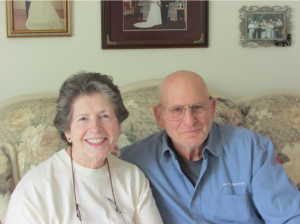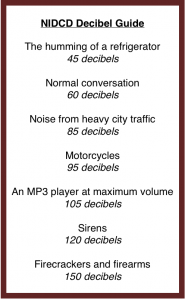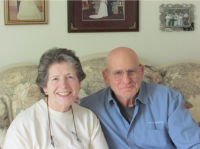A little over two years ago, Howard Thielman received a Cochlear Implant at the Pittsburgh VA Hospital, and his life hasn’t been the same since.
“If I would’ve known then what I do now, I would’ve looked into getting the surgery a long time ago,” Howards says. “It’s one of the best things that could have happened to me. After struggling for so many years with hearing loss, what Cochlear has done with this technology and how it’s helped me to hear again is nothing short of miraculous.”

The start of Howard’s hearing loss can be traced back decades to his time serving in the military. He was in the Marine Corps, serving as a rifleman (0311) from 1961-1965. During his time in the Corps, Howard was stationed on the U.S.S. Enterprise, the world’s first nuclear-powered aircraft carrier responsible for providing security to American troops deployed overseas. As a rifleman on the U.S.S. Enterprise, Howard was constantly inundated with loud and repetitive noises like gun shots, heavy-duty machinery, and aircraft landing and taking off onboard the navy vessel.
“Back then, we were all young twenty-somethings, the military didn’t have the kind of safeguards in place like they do now with our service members,” Howard remembers. “Now, they’re given devices to safeguard their ears. Protecting our hearing wasn’t really a priority for the military or for any of us. We were more concerned with protecting our ship and our troops. We didn’t give too much thought to the lasting effects of being exposed to repetitive, loud noises and what damage that could do down the road to our health.”
After being honorably discharged from the Marine Corps and returning to civilian life, Howard secured a position as a refueler, working first at the Allegheny County Airport in West Mifflin before transferring out to work at the Pittsburgh International Airport in Findlay Township in 1968. He worked as a refueler for more than 40 years and only recently retired.
As a refueler, Howard was forced to deal with many of the same sounds that he encountered while in the Corps, like rumbling high-powered engines and planes landing and taking.
“Working as a refueler is hard work and can at times be dangerous and chaotic. It’s hard to articulate just how loud the runway and that environment can be. You get used to it. I know I did and so did my coworkers but I noticed as the years progressed, my ability to hear was waning. As I got older, I wore hearing aids, but then they weren’t even strong enough to help me,” Howard comments.
 Individuals like Howard who are continually exposed to loud, repetitive noises, can incur permanent hearing loss, according to the National Institute on Deafness and Other Communication Disorders (NIDCD), one of institutes within the NIH. What Howard encountered during his time in the Marine Corps and as a refueler is called Noise-Induced Hearing Loss (NIHL). The NIDCD estimates that approximately 15 percent of Americans between the ages of 20 and 69—or 26 million Americans—have hearing loss that may have been caused by exposure to noise at work or in leisure activities. Because sound is measured in units called decibels, sounds of less than 75 decibels, even after long exposure, are unlikely to cause hearing loss. However, with long, repeated exposure to sounds at or above 85 decibels, hearing loss can occur. The louder the sound, the shorter the amount of time it takes for NIHL to happen.
Individuals like Howard who are continually exposed to loud, repetitive noises, can incur permanent hearing loss, according to the National Institute on Deafness and Other Communication Disorders (NIDCD), one of institutes within the NIH. What Howard encountered during his time in the Marine Corps and as a refueler is called Noise-Induced Hearing Loss (NIHL). The NIDCD estimates that approximately 15 percent of Americans between the ages of 20 and 69—or 26 million Americans—have hearing loss that may have been caused by exposure to noise at work or in leisure activities. Because sound is measured in units called decibels, sounds of less than 75 decibels, even after long exposure, are unlikely to cause hearing loss. However, with long, repeated exposure to sounds at or above 85 decibels, hearing loss can occur. The louder the sound, the shorter the amount of time it takes for NIHL to happen.
“I was about to throw in the towel when it came to my hearing. One of my hobbies is amateur radio and I host my own show. It got to the point where I couldn’t do that any longer. My wife also acted as my interpreter when we’d go out to dinner with friends. When you lose your hearing or you’re hard of hearing, when you go out in public people kind of look at you like a burden or a nuisance. I finally decided that after wearing hearing aids for so many years I would look into what could possibly be done,” Howard said.
After investigating his options, Howard discovered that the Department of Veterans Affairs offers Cochlear Implants as a part of its healthcare services. Because of Howard’s time in the Marine Corps, his VA status as a service-connected veteran, and meeting the medical qualifications, his implant was covered at no cost to him. He had his surgery performed at the Pittsburgh VA Hospital in the spring of 2013. The service is also covered by Medicare.
“I can’t say enough good things about the VA Hospital, I got no complaints and the doctors there literally saved my life. They say I’m their first patient who ever had life-saving ear surgery,” Howard says.
When Howard was in the Pittsburgh VA Hospital, he had a heart attack and credits his Cochlear Implant with not only helping him to hear again but also saving his life. “If I wouldn’t have gotten the implant, I might not have known something was wrong with my heart,” he said.
Sharon Carroll is Engagement Manager for Cochlear Americas and based in Pittsburgh. She works with individuals like Howard before, during, and after the implantation surgery. She has gotten to know Howard during the last year-and-a-half. “He is a great voice for our veteran population and all he wants to do is tell veterans what their options are,” Sharon says. “So many of them aren’t aware that they might be eligible for a Cochlear Implant and Howard is a perfect example of what is possible.”
Since getting his Cochlear Implant and recuperating from his heart attack, Howard is so busy it’s hard to keep up with him, his wife, Diana, shares. Howard is on the board of directors at the Moon Township Volunteer Fire Company, and a member of the Marine Corps League of Sewickley, Vietnam Veterans (Rochester branch), U.S.S. Enterprise Association, and the U.S. Sea Going Marine Association. He also plays an active role with the Boggs Run Volunteer Fire Department in Moon Township, where he was a lieutenant and captain for 11 years.
“I would recommend that anyone who is dealing with hearing loss look into getting a Cochlear Implant,” Howard says. “I’ve found a new lease on life and it’s really helped with my daily life.”
To learn more about hearing loss and if you might be eligible for a Cochlear Implant, visit Cochlear.com or call (877) 804-4000.

